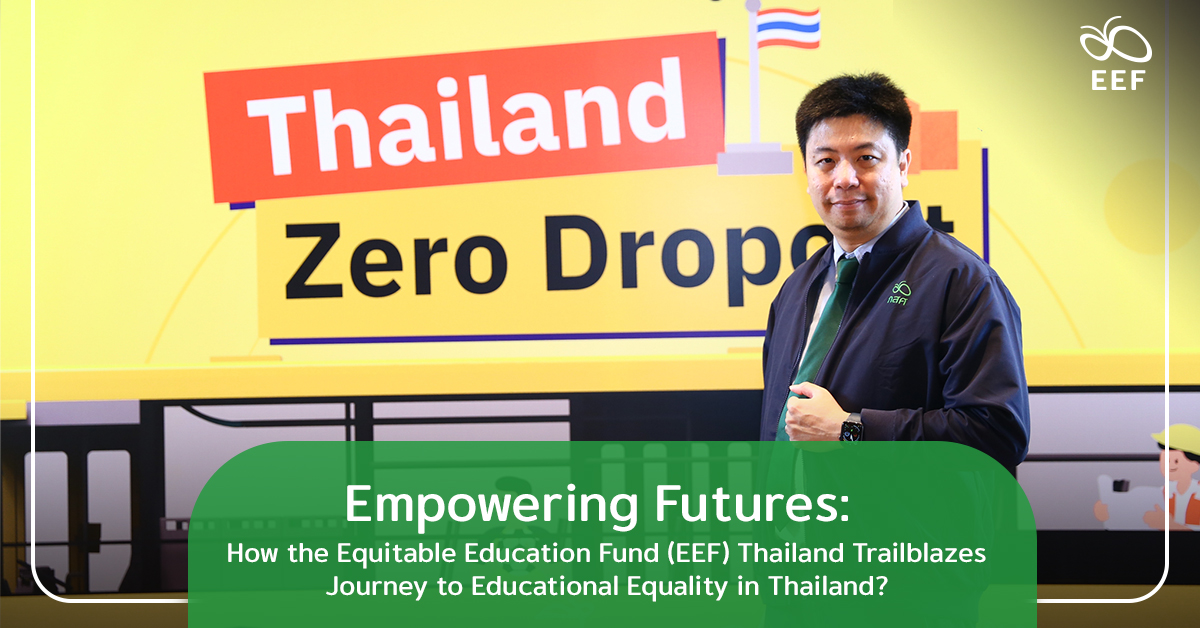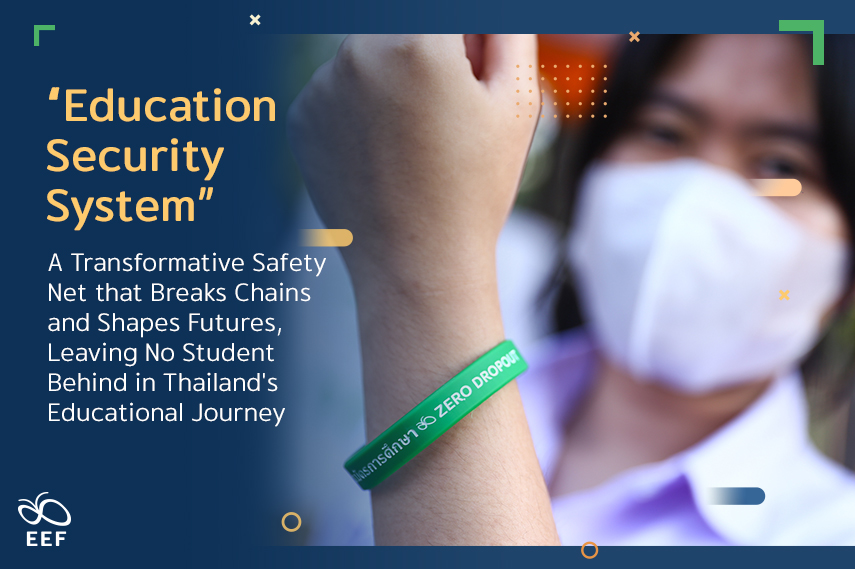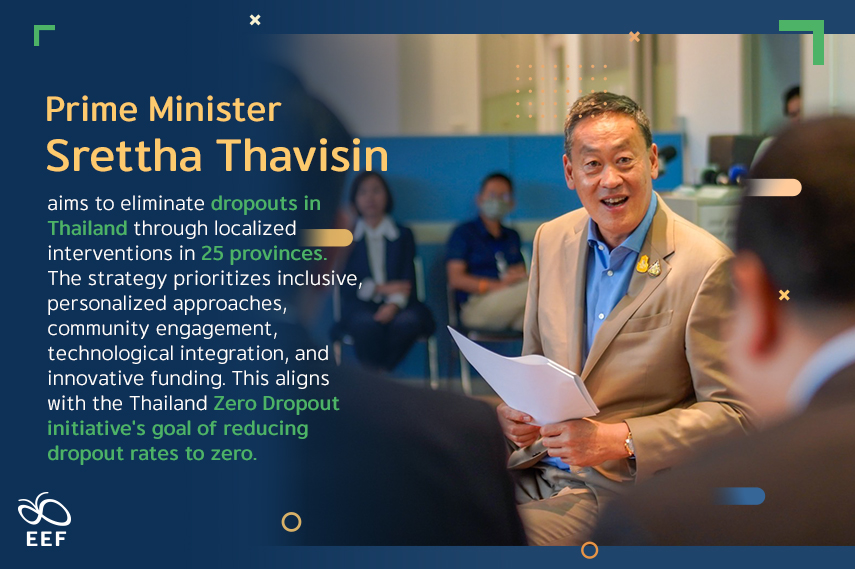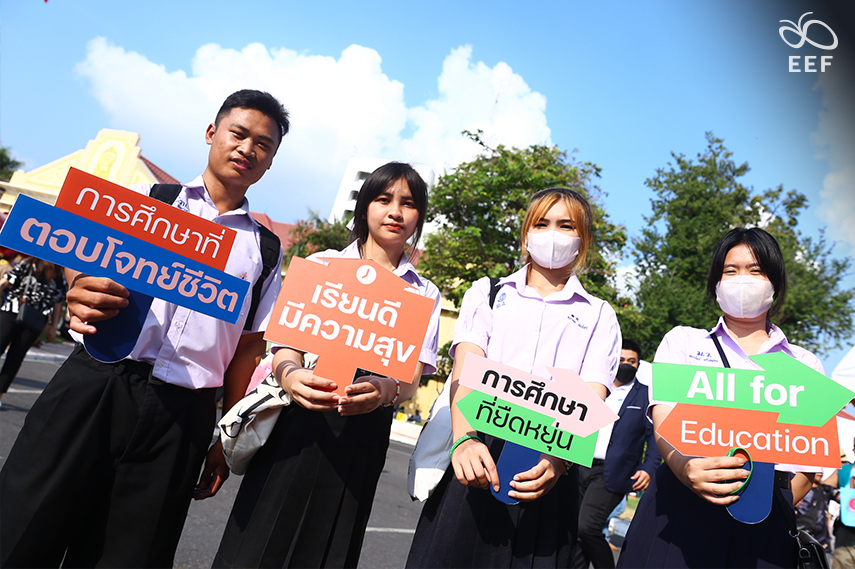
At the heart of addressing educational disparities lies a compelling truth: investing in education is both economically prudent and morally imperative. It transcends charity, evolving into a strategic investment with far-reaching implications — and Thailand is no exception here. The potential of 1.9 million at-risk children, armed with quality education, extends beyond personal fulfillment; it translates into an increase in purchasing power and a broader tax base, benefiting every sector of society — businesses, communities, and public agencies alike. Nevertheless, Thailand’s enduring educational conundrum prompts a critical inquiry: why, despite the country’s 15-year free education policy, does access to quality education remain elusive for many children?
Here lies the essence of the challenge: it’s not solely about financial allocation, but about adept educational and financial management. Along the arduous journey to school, households with incomes below the poverty line encounter formidable barriers: transportation costs, meal expenses, and inadequate learning materials, not to mention the daunting prospect of relocating schools, particularly in remote areas. These challenges converge to engender alarmingly high dropout rates, exacerbated by the poignant reality of children compelled to enter the low-income workforce prematurely to help sustain their families, gradually drifting away from education and never returning.

Tasked with the monumental responsibility of catering to these nearly 2 million children, the Equitable Education Fund (EEF) Thailand operates within the confines of a meager 1% of the national educational budget annually. This stark reality has ignited a fervent call for collaborative innovation, echoing the resounding ethos of “All for Education.” In response to this imperative, the EEF has embarked on a transformative journey, spearheading numerous visionary initiatives, most notably the “Education Security System,” “Area-Based Education,” and the recent addition, “Thailand Zero Dropout,” all bolstered by its pioneering “Innovative Financing” framework. These endeavours stand proudly as pillars of progress, reshaping the educational landscape of Thailand with unparalleled dedication. Now, let’s delve into each of these initiatives to understand their profound impact and significance in addressing Thailand’s educational challenges.

Initiated by the EEF, the “Education Security System” emerges as a transformative safety net, countering Thailand’s educational disparities by ensuring no student succumbs to financial constraints on their educational journey. With poverty rates soaring, exacerbated by the pandemic’s economic fallout, “collaborative, cost-effective, and targeted” strategies become imperative to mitigate heightened dropout risks among children. Leveraging extensive data and partnerships with public agencies and educational institutions, both secondary and tertiary education, the Education Security System provides comprehensive support to economically disadvantaged students. Through meticulous screening processes and a range of non-repayable scholarships, notably the Equity Fund scholarship, all empowered by Proxy Means Test (PMT) and Conditional Cash Transfer (CCT), it offers financial aid and personalized assistance. This contributes to millions of “would-be Lost Einsteins” having been safeguarded, facilitating their seamless transition to higher education or vocational paths for up to 20 years as they aspire for a brighter future.
In confronting Thailand’s educational disparity challenges, especially the burgeoning threat of dropout among children and youth, the EEF’s efforts, though commendable, merely scratch the surface — yet to address this multifaceted issue comprehensively. Presenting a promising solution to this issue is the “Area-Based Education” initiative, which decentralizes educational management and fosters community engagement. Operating on the premise of dismantling disparities into manageable local units, it emphasizes inclusivity and innovation, empowering provinces to tailor educational strategies to their distinct contexts. Harnessing existing database systems and collaborating with the public and, when needed, external agencies, the Area-Based Education initiative enables provinces to craft localized resource distribution and management mechanisms effectively. This signifies a paradigm shift in educational governance, transcending conventional top-down approaches. The initial success witnessed across 12 provinces underscores its transformative potential in reducing educational inequality and fostering self-reliance among future generations well equipped with the tools necessary to navigate the complexities of their areas and an ever-evolving world.
“Area-Based Education” Breaks Educational Barriers, One Province at a Time

Amidst this dire situation, where nearly 2 million students face the looming risk of educational exclusion, the imperative for immediate action to avert the loss of yet another generation to educational disparities becomes undeniable. In response, the “Thailand Zero Dropout” initiative, led by the EEF and its partners, has emerged as a pivotal endeavor to address this challenge — up close and personal. Through innovative models like “Suan Phueng” and “Ratchaburi,” tailored interventions are being implemented to prevent dropouts, foster joyful learning, and promote holistic development among economically disadvantaged students. Aligned with Prime Minister Srettha Thavisin‘s overarching eponymous vision, these localized interventions are set to expand to 25 provinces, prioritizing inclusive, personalized strategies, community engagement, technological integration, and inventive funding mechanisms, all in line with the Thailand Zero Dropout initiative’s straightforward ethos — to bring dropouts down to zero. As this initiative gains momentum nationwide, Thailand stands on the brink of a transformative shift in its educational landscape, poised to cultivate a skilled workforce and a more equitable future for all.
“Zero Dropout” Paves the Way for Dropout-Free Future

In the face of Thailand’s escalating educational challenges, exacerbated by surging poverty and dropout rates, the EEF stands as a beacon of innovation, spearheading transformative financial models to revolutionize educational funding. With nearly 2 million economically disadvantaged students, including 1.2 million classified as very poor, facing dropout risks, it collaborates with public, private, and educational sectors to pioneer “Innovative Financing” approaches, empowered by its Information System for Equitable Education (iSEE) developed to identify and assist children and youth in need. These range from corporate bond issuances to fundraising events, leveraging partnerships to raise critical funds and reintegrate marginalized students back into the educational system, ensuring their educational continuity. Signifying a paradigm shift towards collaborative financing models, these Innovative Financing efforts transcend corporate philanthropy to champion educational equity and societal progress. The EEF’s proactive stance lays the foundation for a more inclusive and enlightened future, where all children and youth have equal access to education, shaping a brighter tomorrow for generations to come.
Breaking Barriers: The EEF’s Innovative Financing Transforms Thai Education Funding
In its mission to address educational disparities in Thailand, the Equitable Education Fund (EEF) Thailand employs a multifaceted approach. At its core lies the Education Security System, serving as a vital safety net for economically disadvantaged students, ensuring that they receive comprehensive support to navigate their educational journey without financial hindrances. Through meticulous screening and non-repayable scholarships, millions of students have been safeguarded, facilitating their transition to higher education or vocational paths as they aspire for a brighter future. Concurrently, the Area-Based Education initiative decentralizes educational management, empowering provinces to tailor effective strategies, thereby reducing educational inequality and fostering self-reliance among future generations. Moreover, the Thailand Zero Dropout initiative emphasizes personalized approaches and community engagement to prevent dropouts and promote holistic development among economically disadvantaged students. Bolstered by Innovative Financing mechanisms, including corporate bond issuances and fundraising events, the EEF ensures sustainable funding for these initiatives, amplifying their impact and fostering broader community engagement. These concerted efforts underscore its unwavering commitment to championing educational equity and societal progress in Thailand.
Concurrently, in the pursuit of the United Nations’ Sustainable Development Goals (SDGs), the EEF emerges as a formidable driving force. Its strategic focus on system-level solutions, powered by data-driven innovation, closely aligns with the pivotal SDG4 — “Quality Education,” which serves as a cornerstone for broader objectives like poverty reduction and sustainable communities. In light of the repercussions of the COVID-19 pandemic, the urgency for effective learning becomes even more apparent, amplifying the significance of the EEF’s initiatives, as outlined in the Bangkok Statement 2022. At the heart of its mission lies a commitment to rallying collaboration across public, private, and educational sectors, alongside the general public, through initiatives like the “Education Security System,” “Area-Based Education,” and “Thailand Zero Dropout,” while advocating for efficient budget allocation mechanisms via its “Innovative Financing” framework. These collective endeavors exemplify the EEF’s steadfast dedication to comprehensively ensuring all children have access to educational quality, aligning with their aspirations, thereby propelling progress towards SDG4 and, by extension, other relevant SDGs.

